
By Toby Klein Greenwald
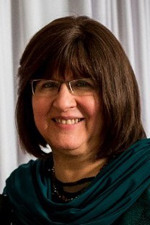
KFAR HAMACCABIAH, Israel — There is something humble and attractive about a foundation not naming itself after its founders, or main donors, but giving itself a Hebrew name that means “Gift of God.” I spent a glorious, mind-expanding day recently at the annual Matanel Israeli retreat in Kfar Hamaccabiah, where their fellows and project directors came together to share what was new, what was different, what progress had been made since they last met, and what their future dreams held.
The projects were varied – geographically, religiously, and in every other way – but they all shared at least several of the principles of diversity, expansiveness, inclusiveness, and bridge-building. Represented were pre-military training academies (mechinot) that accept participants from varied religious backgrounds; educational programs that integrate weak and strong students; a project promoting universal accessibility; programs that advance science and culture for the wider population; new academic publications; extraordinary social service programs; and more.
Among the more unusual projects were the first Arab youth village in Israel, and JustSpirulina, a project for sustainable super-food in the Congo. The Matanel Foundation was founded by Joelle Aflalo and Gad Boukobza. Aflalo says Rav Adin Steinsaltz was also involved from the beginning. She says she decided to found Matanel because, “It was in my DNA, I had to give and create the “keli,” the vessel, and God fills it, and then, try to do the best according to the best of our abilities.” It operates in Israel, but it also works in Europe, in Africa, and in South America.
I would like to focus on three particular projects that moved me deeply.
Tenufa Bakehila. This is an organization, created in 1993, originally as part of the Livnot U’Lehibanot project in Sfat. In 2014 it became an independent non-profit organization, that identifies and renovates living quarters, mostly of families in low income neighborhoods, that are in a deplorable state. This helps their owners find new self-respect and the ability to move forward in their lives, personally and professionally. (www.tenufa.org). The significance of their work cannot be underestimated, along the same lines of those organizations that do not just provide charity, but help the recipients get back on their feet. They also employ social workers who help the families in the areas of health, welfare and employment. They currently operate in 11 cities and, according to its executive director Gabi Nahmani of Alon Shvut, “The organization has helped 4,500 families so far [i.e., that is the number of homes they have repaired] and is ready to expand to 20 more cities in the heart of Israel.”
They employ professional skilled tradesmen whose work, they say, includes repairing moldy, peeling and crumbling walls and ceilings, leaky roofs, hazardous electrical and plumbing problems, door and window frames, loose tiles, kitchen counters and cabinets and more.
They note what they call “a heartbreaking Catch-22 situation: these families often obtained ownership of their homes through government programs, but now, because they own their homes, are ineligible for aid. With no ability to afford even basic repairs, these families find themselves living in terrible conditions with no viable alternative.”
Noga Fisher of Efrat, a member of the administrative team, shared the following stories:
Story One:An IDF officer contacted Tenufa Bekehila because he was worried about one of his new paratroopers. When visiting his home, he saw that the apartment was falling apart. The father has passed away two years earlier and the mother had a teenaged girl, younger brother and adult autistic son living at home. She could not afford to make repairs. The home had crumbling walls, missing doors, a broken shower, a broken window, leaks in the water pipes, rotten kitchen cabinets, broken faucets and more.
The Tenufa workman spent two weeks repairing everything that was broken in the apartment and it gave the family a new lease on life.
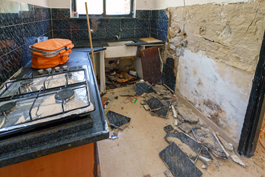
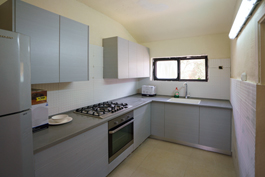
Story Two:
In a heartbreaking case, Tenufa Bakehila was called in by Kiryat Gat’s Social Services Department as part of an attempt to keep a family together, despite the “letter of the law,” which would have required the family to give up its four small children for adoption.
The small apartment was originally home to a widowed grandmother, her two mentally-ill adult sons, her divorced daughter and the daughter’s four young children. The deteriorating physical condition of the home exacerbated the mental condition of the adult sons, leading to violent rages in which they destroyed most of the home’s furniture and doors. Social Services institutionalized the sons, adding a deep psychological level to the physical damage that had already been inflicted on the family.
After the sons were removed from the family setting, the apartment continued to deteriorate. Among other problems, an unrepaired clog in the drainage system resulted in a backup that left standing, rancid water in the shower that leached into the rest of the bathroom, and from there into the walls.
When the city’s Social Service agency discovered the severity of the situation, they removed the children and placed them in foster care. In parallel, they held an emergency planning session to determine its next steps
With the goal of creating a scenario in which the children could be returned to their mother, Kiryat Gat’s Social Services formed a plan of action whose center-point was the availability of Tenufa Bakehila’s services.
Tenufa Bakehila provided the work and materials required to bring the apartment up to a decent standard; and provided ongoing social services to support the traumatized family. Given this commitment, Social Services was ready to begin a process that it hoped would eventually lead to the restoration of the family.
After the physical renovation of the home was completed, Kiryat Gat’s Social Services determined that the four children could return for home visits on weekends and holidays. Tenufa Bakehila’s own social worker maintains close touch with the grandmother and mother, helping them prepare for these visits.
While permission has not yet been granted for the permanent return of the children to the family, the situation has improved dramatically. The traumatized mother and grandmother now look at life with a more positive outlook with the knowledge that their children may soon be able to return home for good.
These are just two of thousands of stories from the last 25 years.
Technoda, directed by Dr. Gadi Mador (technoda.org.il), is a science and technology education center, whose activities take place in Hadera and the surrounding areas, which has programs for students from kindergarten up through high school and beyond, in addition to running conferences and professional development events. It was established in 1986 through the Project Renewal program of the Jewish Agency for Israel.
Their vision, they say, is to promote academic excellence in Israelis from all backgrounds and to respond to develop the future generation of Israeli leaders of science and technology. 250,000 children and youth visit annually.
Their community-social goal is to bridge social and economic gaps in Israeli society by providing a supportive educational framework for children from weaker populations with emphasis on technology and science.
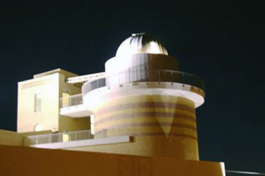
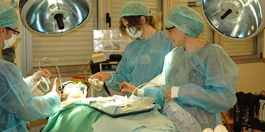
Technoda includes, among other things, an interactive science museum, a science park, space and astronomy events, the second largest planetarium in Israel, in which advanced stargazers can add meridian lines, celestial equator, and ecliptic plane to the night sky simulation, and a medical simulation unit, where one has the option of performing operations in a simulated setting. Using cutting edge medical equipment, accessible elsewhere only to professionals, students from as young as 6th grade can start learning medicine.
They have a stellar observatory whose “star” is a 16” telescope, with an advanced automatic system that recognizes and tracks tens of thousands of stars and celestial bodies. A special video camera can be attached to the main telescope to transmit real time pictures of the sun, moon, planets, and other objects directly to the large screen in Technoda’s auditorium, and a very sophisticated CCD camera for astronomic photography can be used for research purposes by university and high school students.
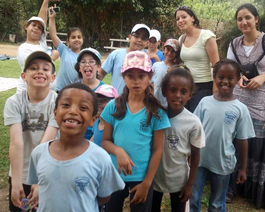
Dr. Mador described and showed on screen the moving work that Technoda is doing in the nearby Givat Olga neighborhood. These children, many of whom would just be wandering the streets during their free time and summer vacation, are exposed to a whole world of science and technology through Technoda’s programs. During the school year, they are part of a program called Afikim, in which up to 250 children and youth can participate. They receive hot meals after school, help with homework and science activities until the evening. During the summer, they receive special summer programs. According to Technoda, the success of the Afikim program has been proven through the improved grades of the participants, both in relation to their peers not in the program and in relation to the level of knowledge and skills measured at the beginning and end of each year.
Most of the Givat Olga children do not receive high scores on standardized tests for gifted programs, but Technoda identifies approximately 80 potentially high achievers and they receive advanced programming (depending on their grade level) in technology, chemistry, first aid and astronomy. They are also taken on experiential field trips and participate in special events that enrich their inner world.
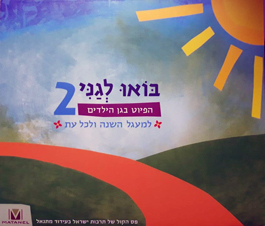
In closing, Bo’u Lgani, “Come to my pre-school/garden” (double entendre). All Israeli children grow up singing the same simple pre-school songs, but what Piyut (www. piyut.org.il) has done is taken those songs, without altering the basic melody, back to the Jewish historical musical tradition – Sephardic, Yemenite, Ethiopian and Hassidic – so they are no longer juvenile ditties, but engaging musical melodies.
The songs are enchanting and fun, while introducing rich Jewish musical traditions to children at a young age. The musical team have also composed some original melodies, but in traditional styles, to well-known children’s songs. The singers are both adults and children, soloists, and choirs.
One of the team members said they are currently being used in 500 pre-schools throughout Israel.
These examples are only the tip of the iceberg. The Matanel retreat was an experience at which one could meet the people behind the scenes who have created projects helping children and adults to move forward in science, education, the arts or societal improvement.
There was even a presentation by a boutique winery, whose owner filled glasses for everyone, to drink a l’chaim to continued success for all.
*
Greenwald is an award-winning educational theater director and the editor of WholeFamily.com